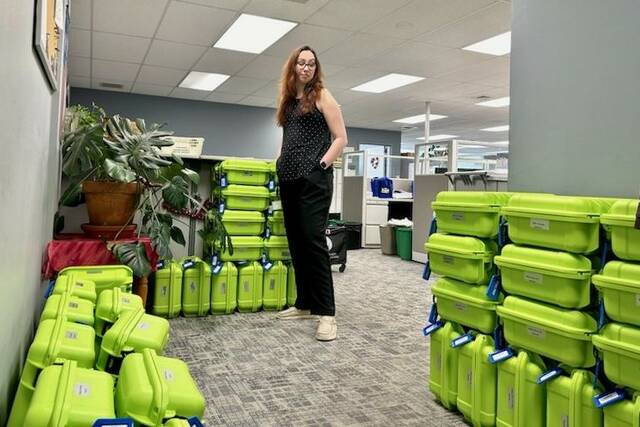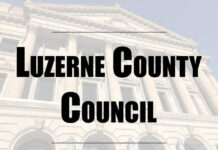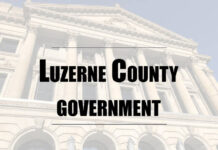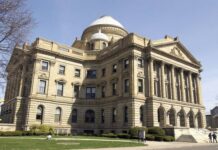
Luzerne County acting election director Emily Cook eyes new electronic poll books from Knowink that have been packed up in the election bureau for April 23 primary election polling places. The books are used for voter sign-in.
Jennifer Learn-Andes | Times Leader
A total 198,334 Luzerne County residents are registered to cast ballots in Tuesday’s primary election, although only Democrats and Republicans will be permitted to nominate candidates in state and federal races.
Pennsylvania has closed primaries, but the county’s 26,977 voters who are not Republicans or Democrats will have an opportunity to vote on the county study commission referendum and candidates.
According to the latest statistics, the county has 86,993 Democrats and 84,364 Republicans.
Voters must decide whether a seven-citizen commission will convene to reevaluate the government structure and simultaneously select seven of 17 candidates to serve on the commission if it is activated.
If the answer is yes, the commission would have nine months to report findings and recommendations and another nine months if it is opting to prepare and submit government changes. An extra two months is allowable if the commission is recommending electing council by district instead of at large.
Voters would ultimately have to approve a commission recommendation for it to take effect.
The commission would be free to recommend alterations to the existing charter, an entirely new charter or a return to the prior three-commissioner/row officer structure that was replaced by home rule’s 2012 implementation.
All 17 study commission candidates have stated they are not advocating a return to the old commissioner system.
Ballot marking devices at polling places will contain an alert reminding voters they must touch scroll to view all study commission candidates because all 17 names cannot fit on the same screen.
The commission candidates, in the order they will appear on the ballot: Cindy Malkemes, Dallas Township; Mark Shaffer, Wilkes-Barre; Alisha Hoffman-Mirilovich, Fairview Township; Vito Malacari, Hanover Township; Claudia Glennan, Salem Township; Stephen J. Urban, Kingston; Andy Wilczak, Wright Township; Ted Ritsick, Forty Fort; Charles Sciandra, Duryea; Mark Rabo, Hazleton; Sandra DeBias, Hazle Township; Tom Bassett, Pittston; Vivian Kreidler-Licina, Nescopeck Township; Fermin Diaz, West Hazleton; Matt Mitchell, Plains Township; Timothy McGinley, Kingston; and Dave Chaump, West Pittston.
To help voters prepare for all races, the county has posted sample ballots on the election bureau page at luzernecounty.org. Note that voters must select one of three sample ballot options — Democrat, Republican or non-partisan.
Poll basics
Polls will be open from 7 a.m. to 8 p.m. A list of all polling places is posted on the election bureau’s main page at luzernecounty.org.
Upon arrival, voters in all 186 precincts will sign in using new electronic poll books from Knowink. Paper poll books also will be on hand at precincts in the pilot program as a back-up, officials said.
After sign-in, voters make selections on touchscreen machines and then receive a paper ballot printout to verify their choices. After reviewing this printout, voters must feed the paper into a tabulator.
As in the past, county officials emphasize voters should not leave the polling place with this paper because it must be entered into the tabulator to lock in their vote.
Those with questions or concerns about the ballot marking devices, printouts or tabulators — or anything else they encounter in the polling place — should alert the judge of elections before they cast their ballots so the judge can assess the situation and, if warranted, resolve it officials say.
Mail ballots
Primary election mail ballots have been issued to 25,288 county voters who requested them, and 12,166 had been returned as of Friday afternoon, according to county Acting Election Director Emily Cook.
Ballots must be physically in the election bureau by 8 p.m. on Election Day, and postmarks do not count.
Here are the drop box locations and availability schedules:
• Misericordia University, Passan Hall, 100 Lake St., Dallas — 7 a.m. to 8 p.m. Sunday and 7 a.m. to 5 p.m. Monday.
• Hazleton Exchange Building, 100 W. Broad St., Hazleton — 8 a.m. to 4 p.m. Monday.
• Wright Manor (main lobby), 460 S. Main Road, Mountain Top — 7 a.m. to 8 p.m. Sunday and 7 a.m. to 5 p.m. Monday.
• Penn Place (main lobby), 20 N. Pennsylvania Ave., Wilkes-Barre — 8 a.m. to 4:30 p.m. Monday and 8 a.m. to 8 p.m. Election Day. In addition, a countertop box is available in the election bureau on the second floor at Penn Place.
Penn Place is the only drop box site available on Election Day.
Mail voters who do not return their ballots also can bring the ballot package that had been sent to them — the ballot and envelopes — to their polling place so it can be voided, allowing them to vote on the ballot marking device at their polling place.
Voters who requested but never received a mail ballot can cast a paper provisional ballot at their polling place.
Provisional ballots are marked by hand and reviewed last so the county can verify a mail ballot was not also received from that voter. The details are important for provisional ballots. They must be placed in a secrecy envelope, which is then inserted in an outer envelope. Three signatures — two from the voter and one from the judge of elections — are required on the outer envelope for the vote to count.
Results
Results will be posted and updated at luzernecounty.org after the polls close.
The state’s electionreturns.pa.gov site will provide updated unofficial results in state races.
Voters may call 570-825-1715 or email elections@luzernecounty.org for assistance or to report any issues.
The county must complete its unofficial tally of ballots, including mail ones, by midnight on election night as a condition for its acceptance of a state election integrity grant.
First-time voters should bring proper identification materials. Approved forms of photo identification include a Pennsylvania driver’s license or PennDOT identification card, a U.S. passport, or ID issued by any Pennsylvania government agency, the U.S. government, the U.S. armed forces, an employer or educational institution, the state said. Non-photo identification must contain the voter’s name and address and can include confirmation issued by the county election bureau, non-photo ID issued by Pennsylvania or the U.S. government, a firearm permit, government check or current paycheck, bank statement or utility bill.
First-time voters who do not bring ID to the polls can return with identification or must be offered a provisional ballot.
Secretary of the Commonwealth Al Schmidt issued a release encouraging voters to educate themselves about their rights before they vote in person, directing them to extensive information posted at vote.pa.gov.
If a voter is challenged based on their identity or residency, the voter may vote normally by signing a challenge affidavit and producing a witness who is also a registered voter in the precinct to vouch for them, the release said.
If the voter cannot or does not want to produce a witness, the voter may cast a provisional ballot. Identity and residency are the only bases for challenging a voter at a polling place.
Voters have the right to assistance at the polling place, including language or literacy assistance. A voter may select any person to assist as long as the person is not their employer, their union representative or the judge of elections, it said. Voters do not need to be designated as “assistance permitted” in the poll book to receive help. A person who wants assistance will be asked to sign an assistance declaration at the precinct unless the poll book already indicates “assistance permitted.”
Voters have the right to vote without being subjected to intimidation, harassment or discrimination. A voter who experiences intimidation should report it to the judge of elections, the county election board, the county district attorney’s office or the Department of State’s hotline at 1-877-VOTESPA (1-877-868-3772).
Reach Jennifer Learn-Andes at 570-991-6388 or on Twitter @TLJenLearnAndes.



